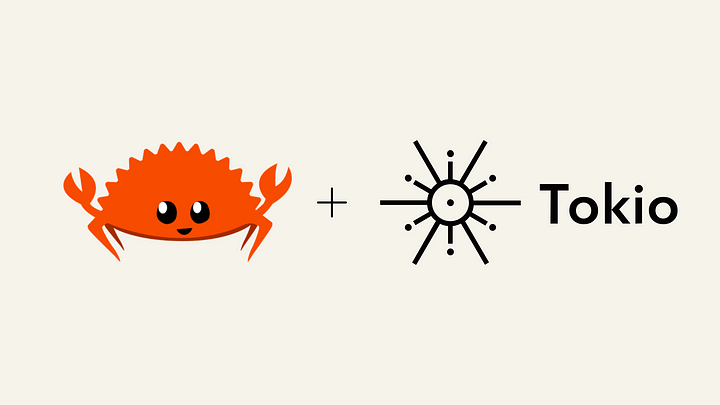
Asynchronous Programming in Rust with Tokio
Asynchronous Programming in Rust with Tokio
This document provides a comprehensive guide to using Rust’s Tokio library for asynchronous programming. It covers fundamental concepts, code examples, and advanced usage techniques.
Getting Started with Tokio
Basic Example
The #[tokio::main] macro simplifies setting up an asynchronous runtime. Below is a simple example:
async fn hello_world() -> String {
"Hello World".to_string()
}
#[tokio::main]
async fn main() {
let value = hello_world().await;
println!("{}", value);
}
What Does #[tokio::main] Do?
- Copies code from the main function.
- Starts an asynchronous runtime.
- Executes the code within this runtime.
Here’s a manual setup without the macro:
fn main() {
tokio::runtime::Builder::new_multi_thread()
.enable_all()
.build()
.unwrap()
.block_on(async {
println!("Hello World!");
});
}
Running Blocking and Asynchronous Tasks
Sometimes, blocking tasks and async tasks need to coexist. Here’s how to handle them:
use std::{thread, time};
use tokio::time::{sleep, Duration};
fn blocking_call() -> String {
thread::sleep(time::Duration::from_secs(5));
"Finally done".to_string()
}
async fn async_call(id: i32) {
sleep(Duration::from_secs(1)).await;
println!("Async Call: ID {}", id);
}
#[tokio::main]
async fn main() {
let blocking_call_handle = tokio::task::spawn_blocking(blocking_call);
let mut async_handles = Vec::new();
for id in 0..10 {
async_handles.push(tokio::spawn(async_call(id)));
}
for handle in async_handles {
handle.await.unwrap();
}
let result = blocking_call_handle.await.unwrap();
println!("Blocking call result: {}", result);
}
Key Concepts
- Blocking Tasks: Use
tokio::task::spawn_blockingto execute tasks in a separate thread, ensuring other async tasks remain unaffected. - JoinHandle: Acts as a bridge between a spawned task and the main thread, giving access to the task’s return value.
Unit Testing Asynchronous Code
Testing async code requires specialized setup. Here’s how:
#[tokio::test]
async fn test_add() {
assert_eq!(async_add(1, 1).await, 2);
}
To control threading during tests, you can use:
#[tokio::test(flavor = "multi_thread", worker_threads = 1)]
Synchronization Primitives
Mutex
A Mutex ensures mutual exclusion, allowing only one task to access data at a time.
use tokio::sync::Mutex;
#[tokio::main]
async fn main() {
let tv_channel = 10;
let remote = Mutex::new(tv_channel);
{
let mut lock = remote.lock().await;
*lock = 42;
}
println!("Updated channel: {}", *remote.lock().await);
}
Thread-Safe Mutex: Combine Mutex with Arc for shared ownership across tasks.
Semaphore
Limits access to a shared resource for a fixed number of tasks.
use std::sync::Arc;
use tokio::sync::Semaphore;
use tokio::time::{sleep, Duration};
async fn teller(semaphore: Arc<Semaphore>, name: String) {
let permit = semaphore.acquire().await.unwrap();
println!("{} is being served", name);
sleep(Duration::from_secs(2)).await;
println!("{} is done", name);
drop(permit);
}
#[tokio::main]
async fn main() {
let semaphore = Arc::new(Semaphore::new(4));
let mut tasks = Vec::new();
for i in 0..10 {
tasks.push(tokio::spawn(teller(semaphore.clone(), format!("Customer {}", i))));
}
for task in tasks {
task.await.unwrap();
}
}
Notify
Allows tasks to notify others about events.
use std::sync::Arc;
use tokio::sync::Notify;
use tokio::time::{sleep, Duration};
async fn deliver_package(notify: Arc<Notify>) {
sleep(Duration::from_secs(5)).await;
println!("Package delivered!");
notify.notify_one();
}
async fn wait_for_package(notify: Arc<Notify>) {
notify.notified().await;
println!("Package received!");
}
#[tokio::main]
async fn main() {
let notify = Arc::new(Notify::new());
tokio::spawn(deliver_package(notify.clone()));
tokio::spawn(wait_for_package(notify.clone()));
}
Advanced Concepts
Barrier
Ensures all tasks reach a synchronization point before proceeding.
use std::sync::Arc;
use tokio::sync::Barrier;
#[tokio::main]
async fn main() {
let barrier = Arc::new(Barrier::new(3));
let mut tasks = Vec::new();
for i in 0..3 {
let barrier_clone = barrier.clone();
tasks.push(tokio::spawn(async move {
println!("Task {} waiting at the barrier.", i);
barrier_clone.wait().await;
println!("Task {} passed the barrier.", i);
}));
}
for task in tasks {
task.await.unwrap();
}
}
RwLock
Allows multiple readers or a single writer for shared data.
use std::sync::Arc;
use tokio::sync::RwLock;
#[tokio::main]
async fn main() {
let lock = Arc::new(RwLock::new(String::from("Initial data")));
let readers = (0..3).map(|_| {
let lock = lock.clone();
tokio::spawn(async move {
println!("Reader: {}", *lock.read().await);
})
});
let writer = {
let lock = lock.clone();
tokio::spawn(async move {
let mut write_guard = lock.write().await;
*write_guard = String::from("Updated data");
})
};
futures::future::join_all(readers.chain(std::iter::once(writer))).await;
}
Channels
Tokio supports communication between tasks through channels. Examples include mpsc (multi-producer, single-consumer) and broadcast.
This guide provides a solid foundation for building robust and scalable asynchronous applications with Rust’s Tokio library. Explore the code snippets, experiment, and enhance your Rust async programming skills!